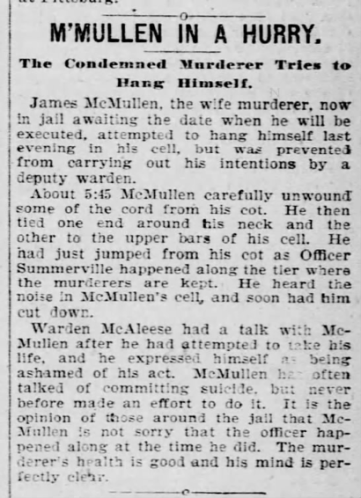James McMullen, his wife, Elizabeth (Lizzie), both Irish born, and their six children lived in a single room in Rice’s Castle, a tenement that housed forty or fifty families in a neighborhood “more Irish than Ireland” (Pittsburgh Post-Gazette, July 29, 1927) on the point at the confluence of the Allegheny and Monongahela Rivers, in the last decade of the nineteenth century.

McMullen, who worked in a rolling mill, was a heavy drinker and abusive husband who forced his wife to work and used her earnings to support his drinking while his family lived in extreme poverty.

On New Year’s Eve, 1894, McMullen beat and stabbed Lizzie to death, then attempted suicide by slitting his own throat. Neighbors and then police responded, and found Lizzie McMullen dead and James McMullen bleeding. He was arrested at the scene.

After three weeks in the hospital recovering from his injuries, McMullen was deemed fit for trial.
His trial, which included the testimony of his children, was described as “the shortest homicide case on record in the county,” though the verdict took forty-five hours and fifty ballots to reach.

McMullen’s alcoholism and the evidence of his mental unfitness complicated the jury’s decision, which, in a “surprise” verdict, found him guilty of first-degree murder on April 25, 1895. He was sentenced to death on June 1, 1895.
While awaiting execution, McMullen attempted to hang himself in jail on August 17, 1895.

McMullen’s clemency request centered on a letter from his attorney that portrayed James and Elizabeth McMullen as destitute and degenerate, lacking the sensibilities to be deserving of the law’s ultimate punishment or to be worthy of the law’s ultimate protection.

Finding him unfit for execution, the Pardon Board recommended that his sentence be commuted to life imprisonment in January 1896. That commutation took effect on February 8, 1896.
James McMullen spent the remainder of his life in prison. He died of kidney disease in Western Penitentiary on April 23, 1916.




2 thoughts on “James McMullen”